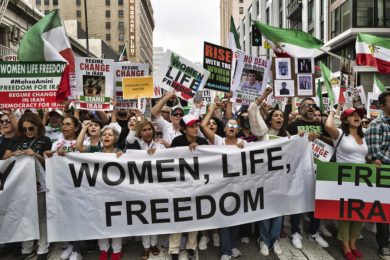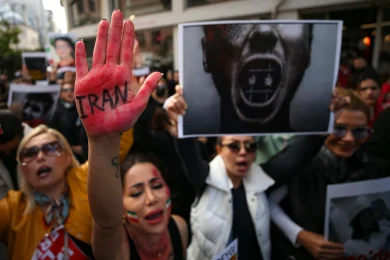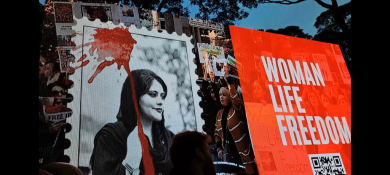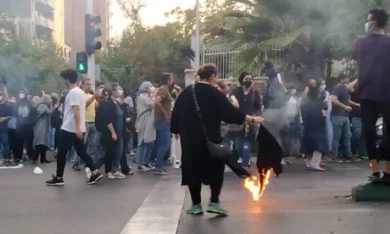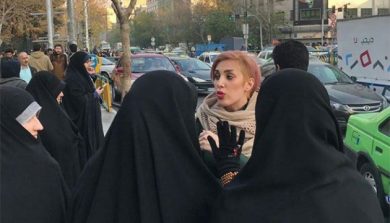Iranian women are leading a historic movement for freedom, equality, and justice, standing at the forefront of protests that have gained international attention. Their courage in the face of systematic oppression by the Islamic Revolutionary Guard Corps (IRGC) has inspired people worldwide. The “Women, Life, Freedom” movement, sparked by the tragic death of Mahsa Amini in 2022, has become a powerful symbol of resistance against gender-based repression. However, despite their determination, global solidarity is crucial in amplifying their voices and sustaining their fight for a free Iran.
This article explores:
• The role of Iranian women in leading the freedom movement.
• The challenges they face under the IRGC’s rule.
• The importance of global solidarity and how the world can support their struggle.
• Practical actions that individuals, governments, and organizations can take to empower Iranian women.
1. The Role of Iranian Women in the Freedom Movement
A. Women Leading the Call for Change
Iranian women have historically played a pivotal role in political and social movements. However, their leadership in the “Women, Life, Freedom” movement has been unprecedented. From tearing off mandatory hijabs to leading protests on the streets, women are challenging the very foundation of the regime’s patriarchal control.
B. The Significance of “Women, Life, Freedom”
This slogan captures the essence of the struggle:
• Women: Fighting for gender equality and bodily autonomy.
• Life: Demanding the right to live without fear of state violence.
• Freedom: Seeking political and social liberties in a democratic Iran.
2. The IRGC’s Repression of Women
A. Systematic Oppression
The IRGC plays a central role in enforcing gender-based oppression:
• Mandatory hijab laws used to control women’s bodies.
• Morality police patrolling public spaces.
• Imprisonment and torture of women activists and journalists.
B. Targeting Women Leaders
Prominent women, including Narges Mohammadi, Nasrin Sotoudeh, and Masih Alinejad, have been targeted, imprisoned, or forced into exile for speaking out. Their stories represent the broader fight against a regime that fears the power of women’s voices.
3. Why Global Solidarity Matters
A. Oppression Thrives in Silence
Authoritarian regimes rely on isolation to suppress dissent. By cutting off communication and controlling narratives, they hope to prevent international backlash. Global solidarity breaks this isolation by:
• Amplifying voices of the oppressed.
• Holding regimes accountable for human rights violations.
• Ensuring that women’s demands for freedom are heard worldwide.
B. Historical Examples of Successful Solidarity
From South Africa’s anti-apartheid movement to the Arab Spring, international support has been crucial in democratic transitions. Iran’s movement is no different; global pressure can weaken the regime’s grip and empower those risking everything for change.
4. How the World Can Support Iranian Women
A. Diplomatic Support and Sanctions
1. Designate the IRGC as a Terrorist Organization
While the United States has already designated the IRGC as a terrorist group, other countries, especially in Europe, must follow. This would:
• Isolate the IRGC financially by cutting off its international funding sources.
• Restrict travel for IRGC leaders.
• Send a strong message that gender oppression will not be tolerated.
2. Targeted Sanctions on Human Rights Abusers
Sanctions should focus on:
• IRGC commanders involved in violent crackdowns.
• Judges who sentence women to harsh punishments for peaceful activism.
• Corporations linked to the IRGC’s economic empire, which funds repression.
B. Amplifying Women’s Voices
1. Media Coverage
International media must prioritize:
• Covering Iranian women’s stories.
• Providing platforms for exiled activists.
• Highlighting the role of women in Iran’s fight for democracy.
2. Social Media Campaigns
Hashtags like #WomenLifeFreedom, #MahsaAmini, and #FreeIranianWomen have been powerful tools for raising global awareness. Celebrities, influencers, and politicians should continue using their platforms to amplify these messages.
C. Supporting Digital Freedom
The IRGC uses internet blackouts and cyber surveillance to suppress dissent. The world can help by:
• Providing VPNs and encrypted communication tools.
• Supporting satellite internet initiatives like Starlink, which can bypass state-imposed internet shutdowns.
• Offering cybersecurity training to activists to protect their online activities.
D. Humanitarian Assistance and Legal Support
1. Offering Asylum and Protection
Governments should provide:
• Asylum programs for activists at risk.
• Safe corridors for those fleeing persecution.
• Temporary protection statuses for Iranian women needing urgent support.
2. Legal Aid for Political Prisoners
International organizations must:
• Offer legal representation for detained women.
• Advocate for political prisoners in global courts.
• Push for United Nations interventions where possible.
E. Educational and Cultural Exchanges
• Scholarships for Iranian women to continue their education abroad.
• Cultural programs that highlight the contributions of Iranian women to arts, literature, and science.
• Platforms for Iranian women’s voices in international academic and cultural spaces.
5. The Role of the Iranian Diaspora in Global Solidarity
A. Advocacy and Awareness
The Iranian diaspora plays a critical role by:
• Lobbying foreign governments for firm policies against the regime.
• Organizing global protests to keep Iran’s struggle in the spotlight.
• Providing safe spaces for activists in exile.
B. Digital Activism
Diaspora communities have used digital platforms to:
• Share real-time updates from Iran.
• Debunk regime propaganda.
• Connect Iranian activists with international organizations.
6. Voices of Courage: Stories That Inspire Solidarity
A. Mahsa Amini: A Catalyst for Global Resistance
The death of Mahsa Amini after her arrest by the morality police sparked protests that resonated worldwide. Her story became a rallying cry for gender equality and freedom, highlighting the urgent need for international action.
B. Narges Mohammadi: A Nobel Peace Laureate’s Struggle
Despite multiple imprisonments, Narges Mohammadi continues to fight for human rights from within Iranian prisons. Her Nobel Peace Prize win in 2023 serves as a reminder of the international recognition of Iranian women’s resistance.
C. Masih Alinejad: The Digital Voice of Freedom
Masih Alinejad, an exiled journalist and activist, uses social media campaigns like MyStealthyFreedom to challenge the compulsory hijab law. Despite facing assassination attempts, she continues to amplify the voices of Iranian women.
7. Challenges to Global Solidarity
A. Geopolitical Interests
International responses to Iran’s human rights violations are often complicated by:
• Nuclear negotiations and regional security concerns.
• Economic interests that prevent stronger actions against the regime.
B. Media Fatigue
As global attention shifts, there’s a risk that Iran’s struggle will fade from headlines. Continuous advocacy is essential to keep Iranian women’s fight visible.
8. The Global Impact of Supporting Iranian Women
A. Advancing Global Gender Equality
Supporting Iranian women’s fight sets a precedent for:
• Global feminist movements, showing that gender equality and political freedom are interconnected.
• Challenging regimes that use gender oppression as a tool of control.
B. Promoting Regional Stability
A democratic Iran led by women’s voices could reshape:
• Middle Eastern politics, promoting human rights and stability.
• Global alliances, with Iran potentially becoming a beacon of democracy in the region.
9. What Individuals Can Do to Support Iranian Women
A. Stay Informed
• Follow credible sources reporting on Iran.
• Educate others about Iranian women’s struggle through community events and discussions.
B. Amplify Voices
• Use social media to share updates, stories, and campaigns.
• Engage with Iranian activists and support their causes.
C. Support Relevant Organizations
• Donate to human rights organizations working on Iran-related issues.
• Volunteer for advocacy groups supporting Iranian refugees and asylum seekers.
D. Join Protests and Petitions
• Participate in global protests calling for women’s rights in Iran.
• Sign petitions urging governments to take stronger actions against the regime.
Conclusion: A Global Responsibility for Freedom
Iranian women have shown unmatched courage in their pursuit of freedom and dignity. Their fight is not only a national struggle but a global call for justice. The “Women, Life, Freedom” movement teaches the world that gender equality, human rights, and democracy are inseparable.
However, their courage must not stand alone. The world has a responsibility to ensure that these voices are heard, protected, and empowered. Through diplomatic action, media amplification, digital support, and humanitarian aid, global solidarity can turn this historic movement into a lasting transformation.
Join Our Newsletter!
Stay informed with the latest updates, news, and ways to take action in the fight for justice and global security. Sign up now to get updates delivered straight to your inbox!

